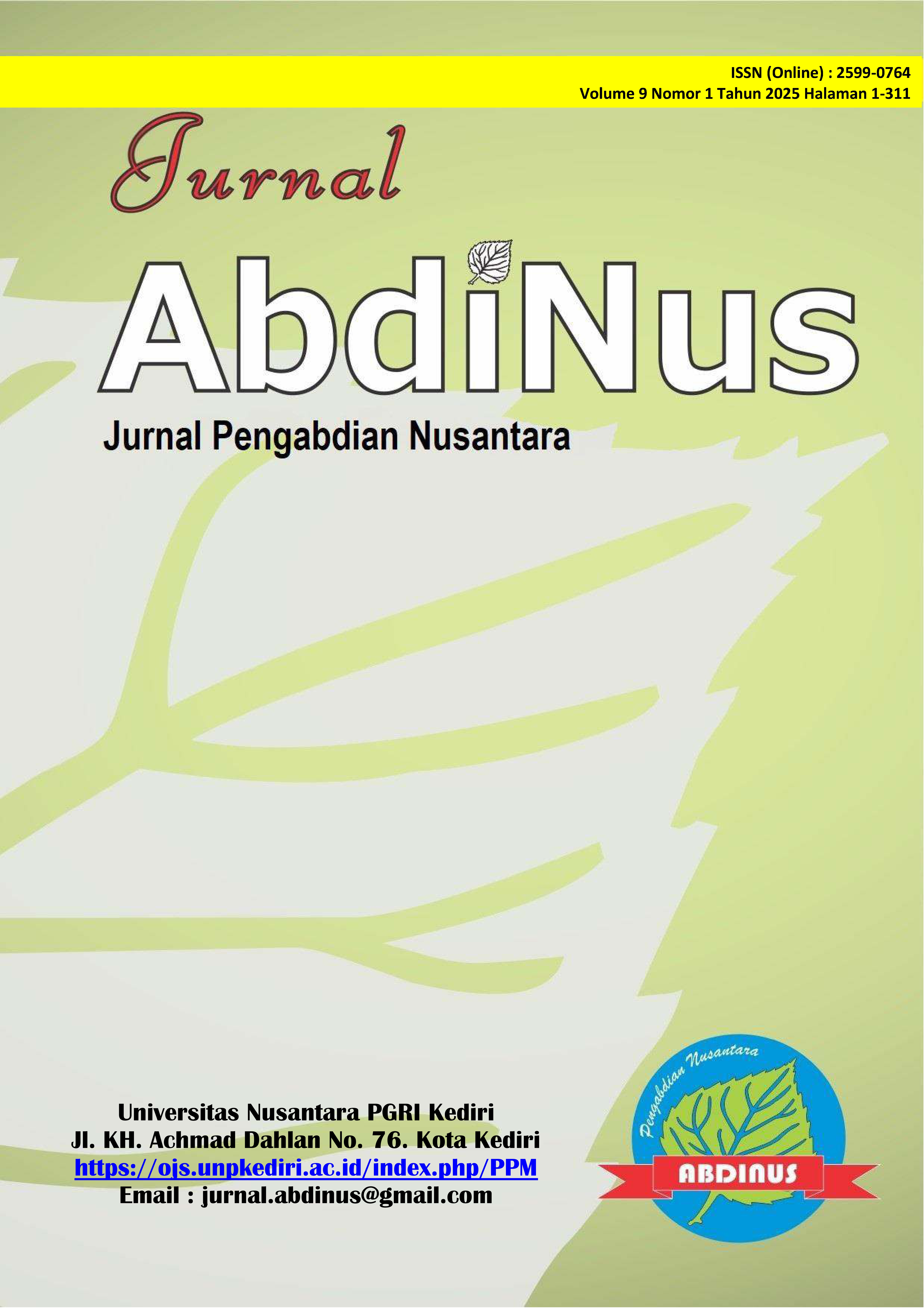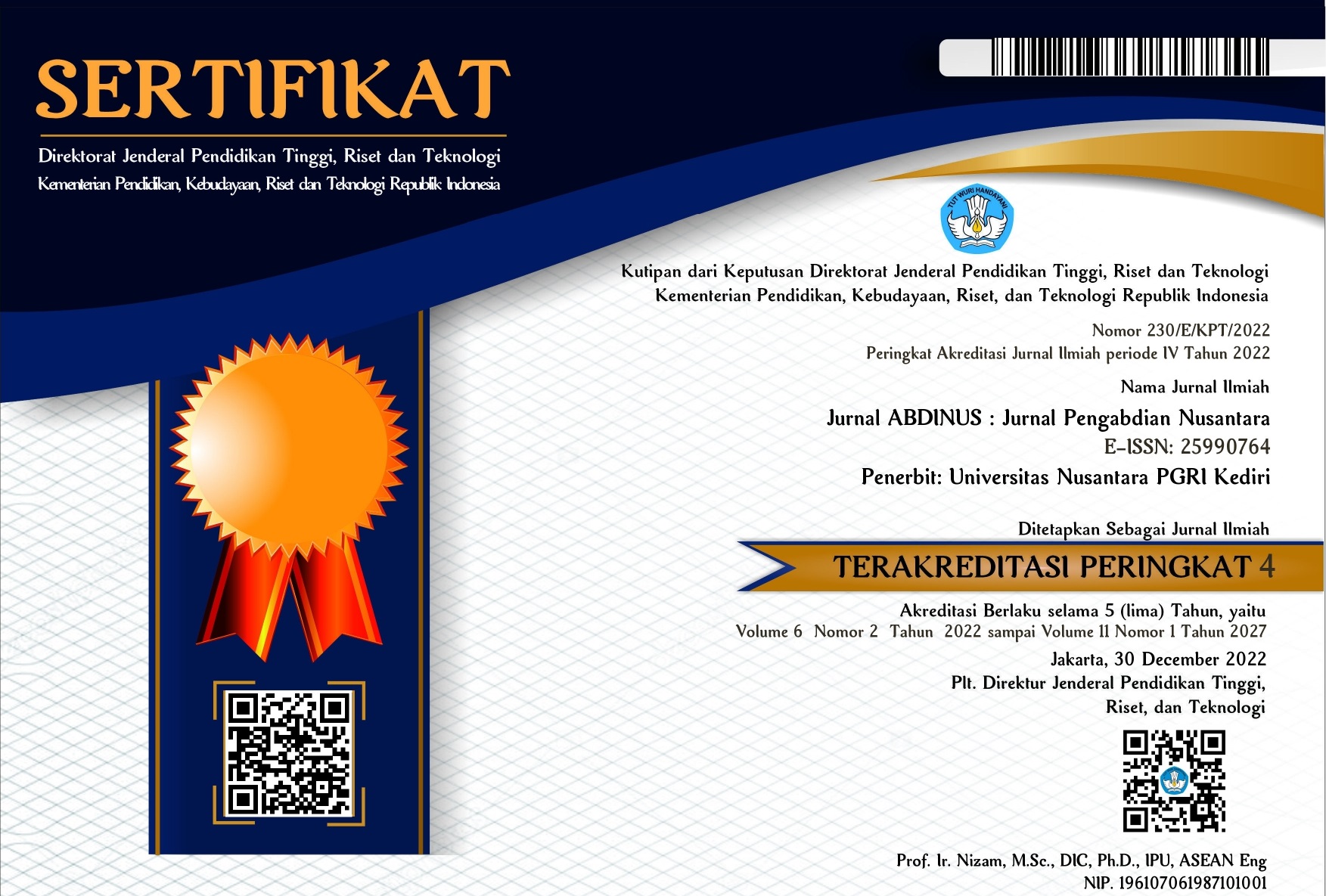Pembuatan Cairan Eco-Enzyme sebagai Solusi Pengelolaan Sampah Organik Rumah Tangga melalui Teknologi Shred-Chopper di Desa Tapanrejo Banyuwangi
DOI:
https://doi.org/10.29407/ja.v9i1.23501Keywords:
Community empowerment, Organic waste, Shred-chopper machine, Eco-enzymeAbstract
Tapanrejo Village is located in Muncar Sub-district with a large area and high population density. This village experiences problems with household waste generation, which is dominated by organic waste. This amount of waste is further increased by the presence of agricultural waste which is the result of community activities. Therefore, the solution applied to this problem is to utilize household organic waste which is processed into eco-enzyme liquid. The partners of this activity are mothers from the Tapanrejo Village Family Empowerment and Welfare Movement Team (TP-PKK). The purpose of implementing this program is that partners are able to manage household waste independently and are able to make eco-enzyme liquid with the application of a shred-chopper machine to improve the quality of life of the community. The stages of activity in this program consist of the stages of socialization, mentoring and direct practice. Monitoring and evaluation of the results of community service activities are carried out by assessing the success of participants in making eco-enzyme liquids and distributing questionnaires of satisfaction with the implementation of activities filled in by each participant. This community service activity begins with the implementation of socialization and training in making eco-enzyme liquids, implementing shred-chopper machines for waste shredding, and monitoring the evaluation of activities based on questionnaires filled out by activity participants. The implementation of the activity went well and the women participating in the activity were very enthusiastic about participating in the training from start to finish. Based on the results of the activity, 100% of the participants were able to make eco-enzyme liquid according to the instructions given and based on the satisfaction questionnaire that 80% of the participants were very satisfied with the implementation of socialization and training on household waste management and making eco-enzyme liquid that had been given.
Downloads
References
Andini, S, dkk. (2022). Strategi Pengelolaan Sampah dan Penerapan Zero Waste Di Lingkungan Kampus STKIP Kusuma Negara. Jurnal Citizenship Virtues, 2(1), 273-281. https://doi.org/10.37640/jcv.v2i1
Badan Pusat Statistika. 2023. Kabupaten Banyuwangi Dalam Angka. BPS Kabupaten Banyuwangi: Banyuwangi.
Chandra Adi Prabowo, d. (2022). Pemanfaatan Sampah Organik Untuk Pembuatan Eco-Enzyme Di Desa Sumber Dari Program Pengabdian Kepada Masyarakat Universitas Sebelas Maret. Proceeding Biology Education Conference (pp. 169-173). https://jurnal.uns.ac.id/prosbi/article/view/69330
Chandra, R, dkk. (2021). Peran Pemberdayaan Kesejahteraan Keluarga (PKK) Dalam Pencegahan Stunting. Jurnal Pekerjaan Sosial, 4(2), 107-123. https://doi.org/10.24198/focus.v4i2.35060
Farah Muhammad, d. (2022). Pelaksanaan Kolaborasi Dalam Pengelolaan Sampah Di Desa Tembokrejo Kecamatan Muncar Kabupaten Banyuwangi. Electronical Journal Of Social And Political Science, 9(4), 406-415. https://doi.org/10.19184/e-sos.v9i4.34469
Fia, F. (2023). Pembuatan Tempat Sampah Organik Dan Anorganik Sebagai Wujud Implementasi Pemilahan Sampah Di Desa Patengan. Transformasi Pendidikan dan Kesejahteraan Masyarakat Melalui Inovasi Pembelajaran dan Edukasi Anti-Bullying. 3, pp. 51-57. Bandung: LP2M UIN Sunan Gunung Djati Bandung. Retrieved from http://proceedings.uinsgd.ac.id/index.php/proceedings/article/view/3904/1810
Hemalatha, M., & Visantini, P. (2020). Potential use of eco-enzyme for the treatment of metal based effluent. IOP Conference Series: Materials Science and Engineering. 716, pp. 1-6. Perak: IOP Publishing. https://doi.org/10.1088/1757-899X/716/1/012016
Maryanti, A., & Wulandari, F. (2023). The Production and Organoleptic Test of Onion Peel Eco-Enzyme. Jurnal Biologi Tropis, 23(2), 311-318. https://doi.org/10.29303/jbt.v23i2.4708
Nindya, e. a. (2022). Edukasi Pengolahan Sampah Organik dan Anorganik di Desa Rejasa Tabanan. Bubungan Tinggi: Jurnal Pengabdian Masyarakat, 4(2), 352-357. https://doi.org/10.20527/btjpm.v4i2.4986
Noviana, L., dkk. (2023). Peningkatan Kualitas Kompos Sampah Pasar Menggunakan Mikroorganisme Lokal (MOL) Bonggol Pisang Dan Dedak. Jurnal Biotek, 11(1), 98-111. https://doi.org/10.24252/jb.v11i1.37128
Rakhman, A. F., dkk. (2022). Analisis Timbulan Dan Komposisi Sampah Perumahan Dan Non Perumahan Wilayah Kabupaten Kutai Kartanegara (Studi Kasus: Kecamatan Anggana). Jurnal Teknologi Lingkungan UNMUL, 6(2), 24-33. http://dx.doi.org/10.30872/jtlunmul.v6i2.8109
Rochyani, N., & Utpalasari, R. L. (2020). Analisis Hasil Konversi Eco-Enzyme Menggunakan Nenas (Ananas comosus) dan Pepaya (Carica papaya L.). Jurnal Redoks, 5(2), 135-140. https://doi.org/10.31851/redoks.v5i2.5060
Rosa, A. M., Rodiah, Y., & Kurniawan, A. (2022). Edukasi Pengelolaan Sampah Rumah Tangga Di Kelurahan Sawah Lebar Baru Kota Bengkulu. Jurnal Abdi Reksa, 3(1), 52-58. https://ejournal.unib.ac.id/abdireksa/article/view/20551
Sundari, S., & dkk. (2024). Desain Mesin Pencacah Sampah Organik Kapasitas 20 Kg dalam Mendukung Produksi Eco-Enzyme dan Kompos. INSOLOGI: Jurnal Sains dan Teknologi, 3(3), 315-324. https://doi.org/10.55123/insologi.v3i3.3584
Zultaqawa, Z. (2023). Manfaat Eco-Enzyme Pada Lingkungan. CRANE: Civil Engineering Research Journal, 4(2), 10-14. Retrieved from https://ojs.unikom.ac.id/index.php/crane/article/view/ 10883/3948















